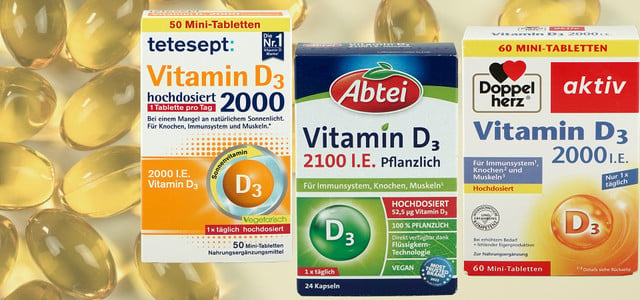
Öko-Test examined vitamin D preparations. Many people expect the funds to be of benefit, especially in the dark season. But the test shows: Many are dosed incorrectly and miss important information. Öko-Test makes a devastating verdict for many dietary supplements.
Basically, a healthy body can produce most of its own vitamin D, simply by regularly letting sunlight reach the skin. Our body can also store vitamin D, so that it is usually sufficiently supplied throughout the dark season.
Nevertheless, studies continue to show that many people in Germany are underserved. Vitamin D preparations are therefore very popular – especially in winter. However, their quality leaves a lot to be desired, as Öko-Test has once again found. Of the 23 products tested, only six were “good” or “very good”.
Vitamin D preparations in the test: All dietary supplements with deficiencies
Öko-Test examined both medicines and over-the-counter dietary supplements. While the four medicines all perform “good” or “very good”, only two dietary supplements are “good”. Ten products fail as insufficient or defective – most because they are dosed incorrectly.
Vitamin D preparations overdosed in the test: What is the correct dosage?
The recommended daily dose for vitamin D is 20 micrograms or 800 international units (IU). The Federal Institute for Risk Assessment (BfR) advises consumers to only take preparations with a maximum of this dose on their own.
Higher dosages should only be taken under medical supervision. A long-term overdose can lead to serious health problems such as nausea, abdominal cramps or even kidney damage and cardiac arrhythmias. Most of the dietary supplements tested by Öko-Test exceed this dosage recommendation.
Dietary supplement with up to five times more vitamin D than recommended
The highest-dosed preparation in the test exceeds the recommended daily dose by five times: Vigantolvit Vitamin D3 oil, drops (Procter & Gamble) contains 100 micrograms of vitamin D per highest recommended daily dose. Overall grade: Insufficient.
Vitamin D pills and drops from well-known brands such as Stada, Tetesept, Abtei and Doppelherz also attract attention with high dosages and fail the test. Apparently, previous similarly poor test results from Öko-Test and Stiftung Warentest (2018) have not changed this.
Only two dietary supplements in the test meet the recommended daily dose of 20 micrograms: Hübner Vitamin D3 drops 800 IU (overall grade: good) and Doc Morris Vitamin D3 tablets 800 IU (overall grade: satisfactory.) Two preparations are below the recommendation, the Pure Encapsulations Vitamin D3 1000 IU, capsules still score “good”.
Even “satisfactory”: Vitafit Vitamin D3, chewable tablets from Norma. However, the testers criticized the controversial sweetener sucralose and declaration errors. All other dietary supplements are dosed too high.
Buy Öko-Test vitamin D preparations as an ePaper
Öko-Test criticizes critical ingredients and a lack of information
In addition to vitamin D, some vitamin D preparations in the test contain controversial or unhealthy ingredients. These include gelling and thickening agents such as carrageenan and carboxymethylcellulose. Both can have negative effects on gut health. Carrageenan is found in the Abtei Vitamin D3 2100 IU vegetable capsules (overall grade: unsatisfactory). Öko-Test also devalues phosphate compounds and the sweetener sucralose because they are suspected of damaging the kidneys or the cardiovascular system.
Talc, used as a filler or anti-caking agent, has recently been classified as “probably carcinogenic” by the WHO cancer research agency IARC. Öko-Test therefore also downgrades this substance in three preparations: in the two medicines from Vigantol and Vitagamma and the high-dose vitamin D3 tablets from Tetesept (overall grade: unsatisfactory).
In addition, Öko-Test criticizes all nutritional supplements in the test for not mentioning the risk groups for vitamin D deficiency or not completely mentioning them. Some people also lack the indication that healthy people can produce and store vitamin D themselves. There are also grades deducted in the test for health claims that are not permitted according to the EU Health Claims Directive.
You can find all details about the test in issue 01/2025 or online at oekotest.de.
Vitamin D: take supplements or not?
Öko-Test emphasizes that most healthy people do not need any additional vitamin D supplements because their body can produce and store sufficient vitamin D through exposure to sunlight.
However, there are groups of people who are at increased risk of vitamin D deficiency and who can therefore benefit from an extra intake. These risk groups include:
- People of older age
- People who spend little or no time outdoors uncovered when the sun is shining
- People with dark skin
Even if supplementation can make sense for members of these risk groups, Öko-Test urgently recommends medical advice to determine the necessity and correct dosage. Without a medical diagnosis, the dosage should under no circumstances exceed 20 micrograms per day. Anyone who buys nutritional supplements should therefore pay close attention to the dosage.
Read more on Techzle\.com:
- Who really needs extra protein products?
- 8 typical heating mistakes that cost you money – and how to avoid them
- Mattress test winners 2024: The winners from Stiftung Warentest and Öko-Test
** marked with ** or orange underlined Links to sources of supply are partly partner links: If you buy here, you are actively supporting Techzle\.com, because we then receive a small part of the sales proceeds. More info.